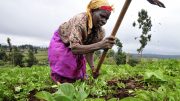The lack of progress on agricultural issues influences climate change. Fact. During the UN Climate Change Conference in Marrakech (COP22) the Kingdom of Morocco, the Food and Agriculture Organization of the United Nations (FAO) and other partners have launched three new initiatives to assist small-scale farmers in building their adaptive capacities.
“We have to transform agriculture to make it more productive and more resilient at the same time. This transformation will help to address, at the same time, the triple threat of hunger, poverty and climate change,” said José Graziano da Silva, FAO’s Director-General.
Over 90 percent of countries include agriculture in their national plans and consider it among their adaptation or mitigation priorities to help limit global temperature rise, in line with the Paris Climate Change Agreement. Sustainable agriculture can reduce malnutrition and poverty, create economic opportunities, safeguards biodiversity and ecosystem services.
The Adaptation of African Agriculture (AAA) is one of the three initiatives that aims to build the resilience of farmers in Africa by promoting sustainable soil management, better water management and risk management linked with tailored capacity development, policies and funding mechanisms. The adaptation benefits yielded by the increased use of climate funds and agricultural projects are expected to have positive global implications. The AAA already has the active support of 28 African countries, several national and private sector entities as well as of the FAO.
The FAO initiative aims to identify priority actions and drive innovation for agriculture adaptation to water-scarce conditions, which are increasing in intensity and frequency due to climate change. The second initiative, the Global Framework on Water Scarcity, supports Near East and North Africa countries in integrating climate action and sustainable water use into policies for their agricultural sectors and cross-sectoral dialogue. Implementing their national climate action plans (Nationally Determined Contributions, or NDCs), the Global Framework also enhance the development of capacity in the climate-water-food-energy nexus, and shares knowledge and experiences with other countries.
To speed up and scale up climate action, the third new initiative discussed at the Agriculture and Food Security Action Event involves public participation in urban and peri-urban areas. Introduced last year, the Milan Urban Food Policy Pact (MUFPP) calls for sustainable food systems that foster the accessibility of healthy food to urban citizens, biodiversity protection and food waste reduction. The signatory cities, 132 worldwide, are committed to guarantee the right to food for all. Cities must be involved in this process as repositories of experiences that contribute to achieving the goals of the Agenda 2030. AL
MORE INFORMATION:
Adaptation of African Agriculture
Global Framework on Water Scarcity







Be the first to comment on "Sustainable agriculture to reduce greenhouse gas, malnutrition and poverty"